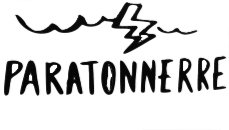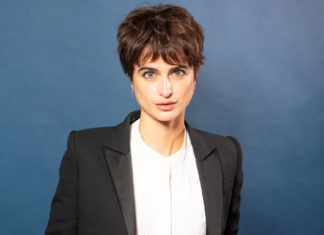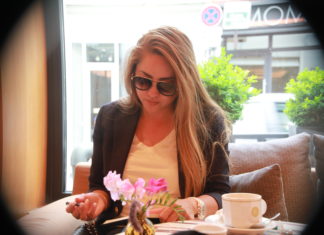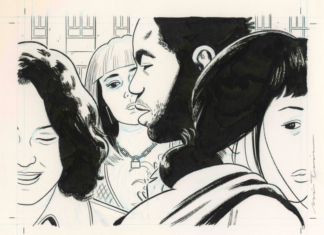Le végétalisme est un nouveau mode qui exclut toute forme de cruauté envers les animaux (nourriture, vêtements et autre système d’exploitation). Cette philosophie de vie devient de plus en plus populaire et nous voulions en savoir plus.
Nous avons interviewé Alex Bury originaire de l’Alaska. Chef cuisinier végétalienne, elle enseigne également la gastronomie et tient un restaurant à Cotati en Californie
Alaska est connu pour être une terre de chasseurs et de pêcheurs. Est-ce particulier d’être végétalien là-bas ?
Plus maintenant. Je suis devenue végétalienne en 1995 lorsque je vivais à Anchorage. Ce fut difficile. Chaque mois de Février, l’Alaska célèbre The Alaska Rondy (le rendez-vous de la fourrure). Vous l’avez deviné la fourrure d’animaux tués durant la saison de la chasse est au premier plan. Ma première année en tant que végétalienne, je suis venue manifester mon opposition avec quelques amis pendant la parade. Tout le monde, même le public, était vêtu de fourrure et là soudain, une drôle de bande de végétaliens arrive avec d’horribles slogans sur des panneaux (nous n’étions pas à ce moment-là adeptes de la communication efficace) et marchant le long du circuit de la parade. J’étais inquiète que nous puissions être agressés physiquement. Mais après ça, nous sommes partis et avons pu savourer un délicieux dîner végétalien dans un restaurant Thaï.
opposition avec quelques amis pendant la parade. Tout le monde, même le public, était vêtu de fourrure et là soudain, une drôle de bande de végétaliens arrive avec d’horribles slogans sur des panneaux (nous n’étions pas à ce moment-là adeptes de la communication efficace) et marchant le long du circuit de la parade. J’étais inquiète que nous puissions être agressés physiquement. Mais après ça, nous sommes partis et avons pu savourer un délicieux dîner végétalien dans un restaurant Thaï.
Alaska est en effet plein de gens qui ne pensent pas que les animaux peuvent souffrir. Chasser et faire des pièges sont glorifiés, il y a de nombreuses boutiques de fourreurs et presque tout le monde a des steaks de flétan et d’élan dans son congélateur.
Mais Alaska est également une belle région. Il n’y a rien de plus beau ailleurs. Des kilomètres et des kilomètres de paysages sauvages attirent des visiteurs du monde entier. Alaska a une petite communauté de randonneurs, de cyclistes, d’amoureux de la nature, de défenseurs du monde sauvage et de campeurs. Ce groupe ne cesse de grossir et s’intéresse de plus en plus au végétalisme.
Je pense que c’est la même chose dans le Montana. Je crois que beaucoup de belles régions du monde ont ce lien avec ceux qui veulent abimer les terres et faire du mal aux animaux alors que d’autres veulent protéger l’écosystème et la faune. Ces derniers pensent qu’ils seront toujours minoritaires et qu’ils n’arrivent pas à avoir l’aura qu’ont les chasseurs et les trappeurs. En fait, ceux-ci ne font que crier car ils savent que nous sommes plus nombreux qu’eux.
Si vous êtes le seul végétalien autour de vous, il faut continuer à chercher. Je parie que vous n’êtes pas le seul.
Lorsque je rentre en Alaska, je vais dans de superbes restaurants végétaliens à Anchorage. Les épiceries vendent du torfukey, du fromage Miyoko, du gardein et d’autres produits non-laitiers. Je viens en Février, l’offre est par contre assez pauvre mais je ne suis jamais affamée.
Quelle fut votre chemin vers le végétalisme?
Quand j’avais 10-11 ans, je vivais à Valdez. Alors je regardais la télévision vers un ami, l’émission fut interrompue par une vidéo d’un animal souffrant et mourant, piégé dans un piège à loup. Avant cela, lorsque j’avais 5 ans, j’ai vu un chat écorché encore en vie sur le porche d’un voisin. Ces exemples avec mes beaux souvenirs d’enfance avec mes animaux domestiques m’ont fait comprendre que les animaux pouvaient souffrir et avoir aussi peur qu’un être humain et je voulais les aider.
J’ai essayé de changer mes habitudes alimentaires mais je n’en avais pas les moyens. Je ne pouvais répondre lorsque quelqu’un me disait qu’on pouvait devenir malade si on ne mangeait pas de viande. Lorsque je suis venue vivre à Paris pendant une année, j’ai mangé pas mal de viande et bu du lait. Je voulais vraiment devenir chef cuisinier. J’ai mangé du boudin une fois. C’était horrible mais je l’ai fait. Je mangeais avec un célèbre chef et je ne voulais pas qu’elle pense que je ne pouvais supporter la viande.
Puis, je suis allée à la Culinary Institute of America à New York. Je ne mangeais pas juste du foie gras, je devais en faire la promotion devant d’autres étudiants. J’ai mangé du veau, de la cervelle d’agneaux,…
Plusieurs années plus tard, je suis revenue en Alaska en tant que chef cuisinier. Durant mon
temps libre, j’ai été bénévole dans une superbe organisation de protection de chiens et de chats. J’ai fini par être sur la liste de groupes de protection animale et j’ai reçu un courrier qui a changé ma vie. J’ai abandonné la viande. Quelques mois plus tard, je suis allée à une conférence sur le droit des animaux à Washington et j’y ai vu mon premier film tourné dans un abattoir où Ingrid Newkirk parlait. C’est là que je suis devenue vraiment végétalienne.
Quand et pourquoi avez-vous décidé de devenir chef cuisinier ?
Après mes cours, je faisais la plonge dans la cantine d’une école religieuse et le responsable était un ancien moine bénédictin. Il est devenu mon mentor. J’ai toujours aimé être dans une cuisine, nourrir les autres et Chef Michael m’a appris comment être cuisinier pouvait être drôle (et fou !). Il m’a encouragé à un ticket sans retour pour Paris. Mes parents n’étaient pas enthousiastes mais comme ils m’aimaient, ils m’ont laissé partir.
J’étais jeune fille au pair à Paris et je cuisinais dans des restaurants. Avec d’autres nouveaux amis, je suis devenue passionnée. J’ai quitté Paris pour The Culinary Institute of America.
Quels sont les points les plus positifs du végétalisme?
Tout d’abord, personne n’a fait de mal ou à tuer un animal pour votre repas. Vous vous débarrassez de cet horrible sentiment. Pendant des années, je me sentais mal et j’essayais de ne pas y penser. Devenue végétalienne, j’ai pensé différemment ma conception de l’alimentation.
J’ai perdu du poids et j’ai été en parfaite santé. Je m’oppose à la pollution des eaux et aux entreprises de viandes. Mais ce n’est pas le point le plus positif.

Je n’aime pas les gens qui s’enrichissent avec leurs fermes industrielles ou leurs abattoirs. Je ne condamne les employés qui souffrent tous les jours de leur travail, je critique les propriétaires. Ce business est détenu par un petit groupe d’hommes blancs qui détruit nos vies. Ce sont eux qui font les lois, qui empêchent les noirs de voter, aux femmes de ne pas obtenir l’égalité et la liberté, aux pauvres d’obtenir la couverture santé ou l’éducation. Si j’achetais une dinde morte, mon argent irait à ces hommes qui font souffrir à la fois les êtres humains et les animaux. Je pense que le végétalisme ne soutient pas de telles personnes.
Les points négatifs ?
Hmm. Les relations familiales peuvent être difficiles. Beaucoup souhaiteraient devenir végétaliens mais ne feront pas le premier pas. Les nouveaux végétaliens peuvent être détestables. Je l’ai été pour le plus grand Malheur de ma famille. Avec le temps, cela a changé et tout ce que nous partageons est végétalien. Je pense que certains sont toujours en lutte avec leur famille à ce sujet.
Certains végétaliens sont sexistes. Pas tous mais cela peut changer beaucoup de personnes. De nouveaux adhérents pensant qu’ils rejoignent une communauté progressiste sont souvent surpris du côté conservateur de certains. Cela peut être très patriarcal et peu ouvert aux femmes ou aux gens de couleur. Devenir végétalien ne devrait pourtant pas vous amener vers le bas…
Si vous ne vivez pas dans une grande ville, il peut y avoir un manque de bons restaurants. Je suis chef et j’aime beaucoup sortir pour manger. Certains n’en voient pas trop l’intérêt et peuvent être très heureux d’être végétaliens au milieu du Dakota du Nord.
Il y a de plus en plus de restaurants végétaliens gastronomiques, de produits, de femmes et de personnes de couleur qui nous rejoignent. La nutrition est bien compris (oui vous avez besoin de B12 !) et vous voyez le mot « vegan » dans beaucoup de chaînes de télévisions. Mais il y a plus d’inconvénients à devenir végétalien aujourd’hui qu’à mon époque.
Cependant, vous pouvez être malheureux de constater qu’aucun de vos amis n’est végétalien. Les liens sociaux et la pression de la société peuvent jouer. J’encourage grandement à trouver d’autres végétaliens. On peut en trouver sur Internet.
Qu’est-ce que vous préférez faire le plus en cuisine?
Cuisiner rend les gens heureux. C’est si gratifiant de nourrir vos amis et ceux qui vous sont chers. J’ai un sentiment de confiance dans une cuisine que je n’ai pas ailleurs. J’ai l’impression de tout contrôler même lorsque les invités arrivent tard ou quand le four tombe en panne. Je sais qu’est-ce qui pourra plaire. Même enfant, j’aimais être dans la cuisine plus que dans le salon avec les invités. Le monde de la cuisine peut être formidable pour les introvertis.
 J’aime la créativité. Alice Waters de Chez Panisse était célèbre quand j’ai appris à cuisiner. Julia Childs, Jacques Pepin, MFK Fisher, toutes ces personnes ont permis que la gastronomie devienne une carrière. J’ai adoré le dur labeur dans les cuisines. J’aimais les défis de la gastronomie dans mon restaurant.
J’aime la créativité. Alice Waters de Chez Panisse était célèbre quand j’ai appris à cuisiner. Julia Childs, Jacques Pepin, MFK Fisher, toutes ces personnes ont permis que la gastronomie devienne une carrière. J’ai adoré le dur labeur dans les cuisines. J’aimais les défis de la gastronomie dans mon restaurant.
Vous avez 200 personnes, vous devez adapter vos recettes, avoir la quantité de nourriture, en espérant avoir un peu de profit de votre travail, avoir de nouveaux plats, de nouveaux menaces. J’ai eu de longues journées de plus de 12 heures. Il y a une incroyable camaraderie dans le monde du restaurant qui me manque maintenant.
Enfant, je n’imaginais pas devenir chef un jour car c’était un milieu d’hommes. De nos jours, il y a de brillantes chefs cuisiniers partout dans le monde. Lorsque j’ai obtenu mon diplôme en 1991, ce n’était pas le cas. J’ai eu la chance d’y être quand la chef Lyde Buchtenkirch-Biscardi fut la première femme chef reconnue. Son parcours m’inspire encore et je repense à elle lorsque j’ai envie d’abandonner. Cela l’amuserait sûrement de savoir qu’elle a une activiste végétalienne parmi ses admirateurs. Mais vous savez quoi ? Elle a toujours été en avance sur son temps. Je parie qu’elle comprendrait bien le végétalisme.
Quel est le plat que vous préférez?
C’est une question très difficile. L’été, les pâtes à la tomate, à la câpre et au citron. Parfois, j’ajoute des pois chiches. Du tofurkey ou du gardein. Au Printemps, je cuisinerai des artichaux et des asperges toutes les nuits si possible.
L’Hiver est ma saison préférée et j’adore les plats américains durant les vacances : l’écrasé de pommes de terres, la courge, les choux de Bruxelles et la tarte aux noix de pécan.
Il y a un ingrédient secret que je garde dans ma cuisine : la sauce de pomme. Chaque Automne, je fais du cidre frais et non filtré. Je le fais pendant des heures jusqu’à ce que cela devienne un nectar épais. Vous n’en n’aurez pas en grande quantité mais vous en avez besoin que de peu. J’en aussi sur de la pizza de la ricotta végétalienne, des poires rouges,… C’est également génial de faire fondre du fromage végétalien avec du pain.
Pour être honnête, je dirais que mon repas préféré est celui qui a la recette la plus simple. J’adore le riz et les haricots. J’en fais de gros pots tous les dimanches et j’en mange toute la semaine avec des légumes, en tortillas, avec du gros sel,… Je ne m’en lasse jamais. J’utilise en ce moment une mijoteuse et je recommande également les cocottes minutes.
Paris fut une bonne expérience gastronomique ?
C’était incroyable. En y repensant, je ne peux croire que j’ai eu une telle chance. J’ai fait de très mauvais plats là bas. J’ai essayé d’être une bonne chef mais ça ne marchait pas. Mais j’ai parfois réussi à faire quelque chose. J’ai appris à sélectionner les produits de saison, que les aliments riches devaient se prendre en petites portions, un encas plutôt qu’une entrée,…
J’ai appris que le shopping, la publicité et la gaspillage que l’on trouve aux Etats-Unis n’étaient pas la norme. J’ai appris à faire des repas simples avec des méthodes de cuisine modestes et de très bons ingrédients.
Il y avait du sexisme mais c’était plus amusant qu’autre chose. J’étais trop jeune pour comprendre même si je remarquais que j’étais la seule femme dans la cuisine. Tous les chefs hommes français pensaient que j’étais étrange parce que je venais d’Alaska, parce que j’étais un peu passionnée et plein d’énergie mais ils ne m’ont jamais détesté sous prétexte qu’une femme était dans leur espace de travail. J’ai appris avec eux et je les ai appréciés. J’ai aimé tous ceux que j’ai rencontré en France. Les gens étaient gentils, accueillants et voulaient toujours m’aider.
Quel conseil donneriez-vous à ceux qui commencent le végétalisme?
Amusez-vous ! Ne soyez pas végétalien et grossier. Ne soyez pas végétalien et fermé. Ne soyez pas végétalien et restreint sur le gras. La nourriture est émotionnelle et notre relation doit être intense. Il faut y aller petit à petit. Par exemple, commencer avec juste votre petit déjeuner. Essayer différents produits et idées. Faites des folies de temps en temps avec les donuts végétaliens et le café. Amusez-vous. Commander des frites lorsque vous sortez. Faites des spaghettis et des boulettes gardein quand vous êtes en famille. La plupart des végétaliens débutants sont souvent choqués lorsqu’ils apprennent la cruauté infligée aux animaux. Le végétalisme devient sérieux et pesant. Si vous vous relaxez, vous le verrez comme quelque chose de bien et pas une punition. En retour, vous verrez que vous pourrez inspirer d’autres à suivre votre voie.
Pensez-vous que vous pourriez manger dans un fast food comme McDonald’s un jour ?
Biensûr absolument. Je viens de commencer à manger chez Taco Bell. Si une grande chaîne de restaurants offrait une option végétalienne, je la soutiendrai. Je ne le ferai pas souvent parce que comme je le disais je n’aimerais donner de l’argent aux grands groupes. Mais en même temps, je suis consciente que j’ai eu beaucoup dans ma vie. Je peux me permettre d’aller chez Veggie Grill plutôt que Taco Bell. Peu de personnes peuvent avoir ce choix. Je veux aider tout le monde à devenir végétalien, pas seulement les riches blancs. Taco Bell a de superbes offres « vegan » peu chères. Et si je recommandais à d’autres d’aller dans certains restaurants, cela veut dire que j’y vais de temps en temps aussi. Si McDonald’s propose un menu « vegan » abordable et délicieux, je serais la première à venir essayer.

Veganism is a way of living which seeks to exclude, as far as is possible and practicable, all forms of exploitation of, and cruelty to, animals for food, clothing or any other purpose. Vegan diets are become more popular nowadays. The following is an interview with Alex Bury from Alaska, land of hunting & trapping. She is a vegan-only chef. She teaches cooking & owns a vegan and organic restaurant in Cotati (California), ‘Sparks at the inn’. She still occasionally works as a private chef
Alaska is a legendary land for hunters & fishers. Is it uncommon to be a vegan there?
Not anymore! I went vegan in 1995 when I was living in Anchorage. That was tough. Every February Alaska celebrates “The Fur Rondy” which is—you guessed it—a festival to celebrate the fur from all the animals killed across the state during trapping season. The first year I went vegan a couple of friends and I protested the Fur Rondy parade. Spectators were dressed in fur. People in the parade were dressed in fur. And there we were, a motley bunch of vegans holding up really horrible protest signs (we hadn’t discovered “effective advocacy” yet) and walking along the parade route. I was worried we would be physically hurt. But even back then, we were able to go out after the parade for a delicious vegan dinner at a local Thai restaurant.
of vegans holding up really horrible protest signs (we hadn’t discovered “effective advocacy” yet) and walking along the parade route. I was worried we would be physically hurt. But even back then, we were able to go out after the parade for a delicious vegan dinner at a local Thai restaurant.
Alaska is indeed full of people who don’t think animals feel pain. Hunting and trapping are celebrated, fur stores abound, and almost everyone has halibut steaks and moose meat in their freezer.
But Alaska is also beautiful. There’s nothing like it anywhere else. Miles and miles of stunning wilderness attracts people from all over the world. Alaska has a thriving little community of hikers and bikers, wildlife lovers, wilderness advocates and backcountry campers. This group of people tends to be more progressive and more interested in vegan food. I think Montana is like this. I believe many of our world’s most beautiful wild places have this intersection of people who want to use and abuse the land and the animals, and other people who want to protect the land and keep the animals (and the ecosystems) healthy. The latter group always believes they are “all alone” or just really small, and they don’t speak up enough to fight the hunters and trappers. There aren’t more hunters–they’re just louder, and they’ve convinced the rest of us we’re outnumbered.
If you feel like you’re the only vegan in your community—keep looking. I bet you’re not.
Now when I go home to visit I can eat awesome vegan food at restaurants all over Anchorage. The grocery stores sell Tofurky, Miyoko cheese, Gardein and a long list of non-dairy milks. If I go in February the produce may not be so great, but I’m not going to starve!
Can you tell us about your paths to veganism?
When I was 10 or 11 years old, living in Valdez (where they had the Exxon Valdez oil spill), I was watching TV at a friend’s house and the regular show was interrupted for a few seconds and replaced with footage of an animal struggling and dying in a steel-jawed leghold trap. Before that, when I was about 5, I saw a skinned cat who was still alive on my neighbor’s porch. Those painful instances combined with my beloved childhood pets proved to me that animals felt pain and fear just like humans, and I wanted to help them.
I tried going veg off and on as a teenager but I didn’t have the resources. I couldn’t argue back when someone told me I would get sick if I didn’t eat meat. Then I moved to Paris for a year and as you can imagine, I ate quite a bit of meat and dairy. I wanted to be a chef so badly! I ate blood sausage once. It was horrible but I choked it down—I was eating with a famous chef and I didn’t want her to see that I couldn’t handle it!
Then I went to the Culinary Institute of America in New York. I didn’t just eat foie gras—I worked to promote it to other students. I ate veal, lamb brains, all of it.
A couple of years later I was back in Alaska working as a private chef. In my free time I was volunteering with a wonderful (but non veg) cat/dog organization. Somehow I ended up on a mailing list for animal groups and I received a PETA mailer. That very first mailer changed me—I stopped eating meat. A few months later I attended an animal rights conference in DC and saw my first slaughterhouse film when Ingrid Newkirk spoke. That was that. I went vegan on the spot.
When and how did you decide to become a chef?
When I was a teenager I got an after-school job as a dishwasher. It was a dining hall for a religious graduate school and the head chef was a former Benedictine monk. He became my mentor. I had always loved being in the kitchen and feeding people and Chef Michael taught me how fun (and crazy!) professional cooking can be. He encouraged me to buy a one-way ticket to Paris. My parents were not as thrilled, but they loved me and let me go. While in Paris I lived as an au pair (taking care of children in a wealthy family’s home) while cooking in Paris restaurants, and with new Paris friends, whenever I could. I was hooked. I left Paris to attend the Culinary Institute of America.
What are the main advantages of veganism? What are the main disadvantages of a vegan diet?
The #1 advantage of veganism is not paying someone to hurt and kill an animal so you can eat it. Getting rid of that is an amazing feeling. For years I struggled with guilt and worked  hard to avoid thinking about it. Once I went vegan I could relax and think about food in a different way.
hard to avoid thinking about it. Once I went vegan I could relax and think about food in a different way.
I like that I lost weight on a vegan diet and I’ve been very healthy ever since. I like making a statement against massive water pollution and waste by not supporting meat companies. But those were secondary gains.
I don’t like the people who own factory farms and slaughterhouses. I don’t blame the workers, who suffer every day on the job. It’s the owners. These huge businesses are mostly owned by the same small group of white men who wreak so much havoc on our lives. These are the guys who make laws (or fund the laws) that block black people from voting; women from having equal rights and freedoms; poor people from getting decent healthcare and education. When I buy a Tofurky holiday roast I’m supporting a company that works for human rights while also not hurting animals. If I were to buy a dead turkey instead, I’d be giving my money to the men who hurt both people I love and animals. Not supporting these guys is a hidden advantage of veganism, I think.
Disadvantages? Hm. Family stuff can be hard. Our family members are the people we most want to go vegan, but they’re often the least likely to—at least at first. New vegans can sure be obnoxious. I was. My poor family! Over time things have completely shifted and now all of our gatherings are vegan. I feel for new vegans who are still struggling with family defensiveness.
If you’re female, you might not like how sexist and regressive the vegan groups can be. Not all of them, but it’s still a big problem and a shock for many people. New donors and activists assume they’re joining a progressive movement and are often disillusioned to find an old-fashioned feeling in the big groups–it can be very “Mad Men-ish,” by which I mean, not very friendly towards women and people of color. Going vegan shouldn’t have to mean lowering your standards in other ways.
If you don’t live in a big city, I would consider a lack of good restaurants a disadvantage. I’m a chef and I like to eat out. A lot. Some people don’t care that much about food or restaurant dining and they could be perfectly happy eating vegan in the middle of North Dakota, but others would be disappointed.
There are more gourmet vegan restaurants every year. More products. More vegan people to meet and bond with. More women and people of color speaking up in the movement. The nutrition is now understood (yes, you need B12!) and we see the word “vegan” all over the major media channels. There are fewer disadvantages now then when I went vegan.
However, you can still be unhappy if none of your friends are vegan. Social interaction and peer pressure matter, even if we like to deny it. Not knowing other vegans can be a disadvantage because your social outings could be less enjoyable. I strongly encourage people to find other like-minded vegan or vegan-ish friends, even if that means mostly online friends at first.
What do you enjoy most about being a chef? Any Alaskan specialties?
Cooking makes people happy. It’s gratifying to feed my friends and loved ones. I have a sense of confidence in the kitchen that I don’t have elsewhere. I feel very in control–even if the guests are late, or the oven breaks. I know I can still make something that will satisfy people. Even as a kid I liked being in the kitchen more than out with the dinner party guests. The chef world can be a great fit for introverts.
I like the creativity. Alice Waters of Chez Panisse was famous when I was learning to cook. Julia Childs, Jacques Pepin, MFK Fisher. All of these people started to normalize the idea that cooking could be a career. I love the hard physical work that comes with the restaurant world as well. I like the different challenges of cooking when I had a restaurant. Getting ready to feed 200 people, calculating the recipes and food waste so I could (hopefully) make a little profit, coming up with new foods and menus, and long days where I had to work hard, on my feet, for 12+ hours. There’s also a great camaraderie in the restaurant world—I miss that now.
What I didn’t expect, when I was a kid thinking about becoming a famous chef one day, was that gender would be an issue. Nowadays you can find brilliant female chefs anywhere you travel. When I attend the CIA (I graduated in 1991) it wasn’t so common. I was lucky to be there when Chef Lyde Buchtenkirch-Biscardi became the first female Certified Master Chef. Her achievements inspire me to this day and often keep me going when I feel like giving up. She would probably laugh if she knew she had a vegan animal rights activist calling her an inspiration. But you know what? She’s always been ahead of her time. I bet she recognizes the growing the demand for plant-based eating and could probably whip up a mean vegan dinner!
What is your favorite dish to Prepare?
That’s a really hard question! In the summer: Pasta with sungold tomatoes, capers and lemon. Sometimes I add braised chickpeas, Tofurky Chik’n or Gardein vegan chicken breasts. In the spring I’ll cook artichokes and asparagus every night if I can. Winter is my favorite season and I love the classic American holiday foods: Mashed potatoes and gravy, winter squashes, holiday roasts, Brussels sprouts and pecan pie.
One secret ingredient I keep in my kitchen is apple glaze. Every fall I get a gallon of fresh, unfiltered apple cider. I cook it down over several hours until it’s thick like agave nectar. You won’t have much by the time it’s reduced, but you don’t need much. I drizzle tiny bits on pizzas (vegan ricotta, red pears, toasted walnuts and apple glaze), salads, baked sweet potatoes. It’s amazing drizzled on some sharp vegan cheese with bread.
 If I’m really being honest I have to say that my absolute favorite dish is the least impressive recipe you can think of. I love rice and beans. I make big pots of brown rice and freshly cooked beans almost every Sunday and I eat it all week long. I eat it with salsa, with different vegetables, in tortillas, drizzled with tamari, sprinkled with really good salt—I eat it and eat it and never get tired of it. I use a slow cooker for my beans these days but I also recommend pressure cookers.
If I’m really being honest I have to say that my absolute favorite dish is the least impressive recipe you can think of. I love rice and beans. I make big pots of brown rice and freshly cooked beans almost every Sunday and I eat it all week long. I eat it with salsa, with different vegetables, in tortillas, drizzled with tamari, sprinkled with really good salt—I eat it and eat it and never get tired of it. I use a slow cooker for my beans these days but I also recommend pressure cookers.
Was Paris a good cooking experience?
It was amazing. Looking back, I can’t believe my luck!
I made a lot of bad food there, trying to act like a fancy chef when I wasn’t. But I also made some great food. I learned how to appreciate seasonal produce. I learned that rich foods can be eaten in small portions, as an accent instead of an entrée, and enjoyed more. I learned that the American way of shopping and hoarding and wasting didn’t have to be the norm. I had simple meals that taught me how basic cooking skills and really good ingredients are better than the fanciest recipe.
The sexism was actually kind of funny. I was too young to fully understand sexism, but even I could see that I was usually the only female in the kitchen. The thing is, I think all the French male chefs thought I was so strange—female, Alaskan, American, a little too energetic and eager—that they never got around to hating me for being a female in their space. So I was able to learn from them. I loved them. I loved everyone I met in France–people were kind, authentic, welcoming and helpful.
What would be your advice for beginning vegans?
Have fun with it. Don’t go vegan and raw. Don’t go vegan and “whole foods only.” Don’t go vegan and fat-free. Food is emotional and food habits are intense. Change one thing at a time. For example, start with just your breakfast foods. Try different products and ideas, splurge occasionally with vegan donuts and coffee drinks, make it fun. When you’ve got that down, start messing around with your favorite lunches. Order the fries when you’re eating out. Make spaghetti and meatballs when you’re craving familiar comfort food (just get Gardein vegan meatballs!). Most new vegans are really upset because they just learned how much pain animals suffer to become meat. Veganism becomes serious and heavy. It is serious—what happens to animals has to stop. But your food doesn’t have to be serious. If you can relax and have fun with it, you’ll more likely stick with it and find it enjoyable instead of a punishment. That in turn will make you more likely to inspire others to go vegan.
Do you think you could eat something in a fast food such McDonald’s one day?
Oh sure. Absolutely. I’ve just recently started eating at Taco Bell. If a big restaurant chain starts offering a vegan option, I’ll support it. I won’t do it often, because as I said earlier I don’t want to give my money to the little boy’s club. But at the same time, I’m aware that I have a very lucky life. I can afford to choose Veggie Grill over Taco Bell. Many people can’t. I want to help everyone go vegan, not just rich white people. Taco Bell has great vegan options, it’s cheap, and it’s everywhere. If I’m going to recommend that others eat there, I should occasionally eat there as well so I know what I’m recommending. If McDonald’s comes up with an affordable and delicious vegan option I’ll be one of the first people to get eat it.








